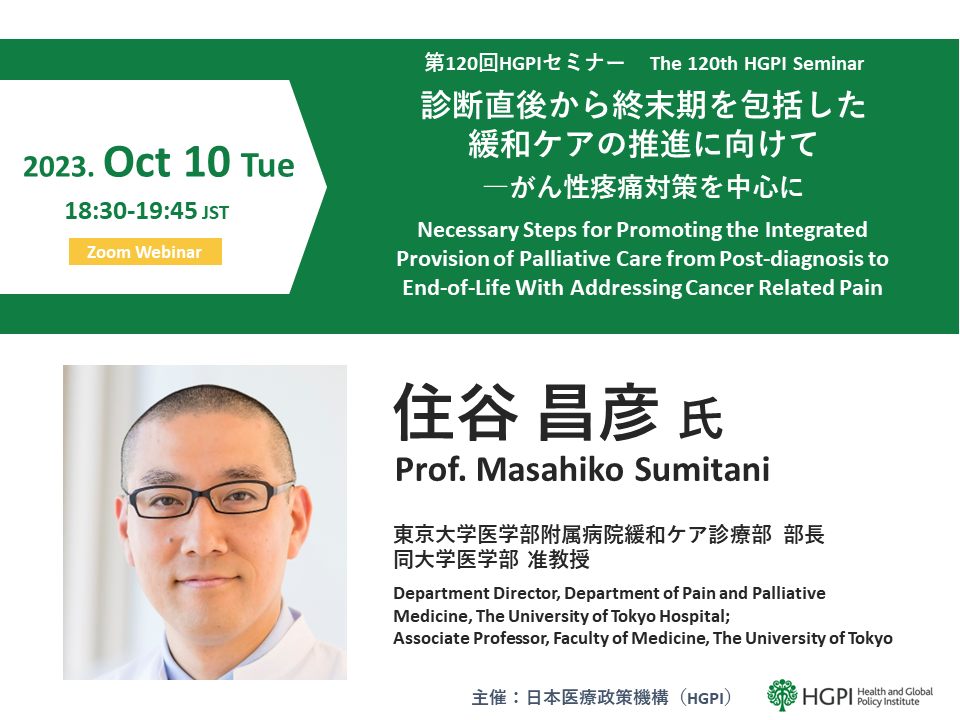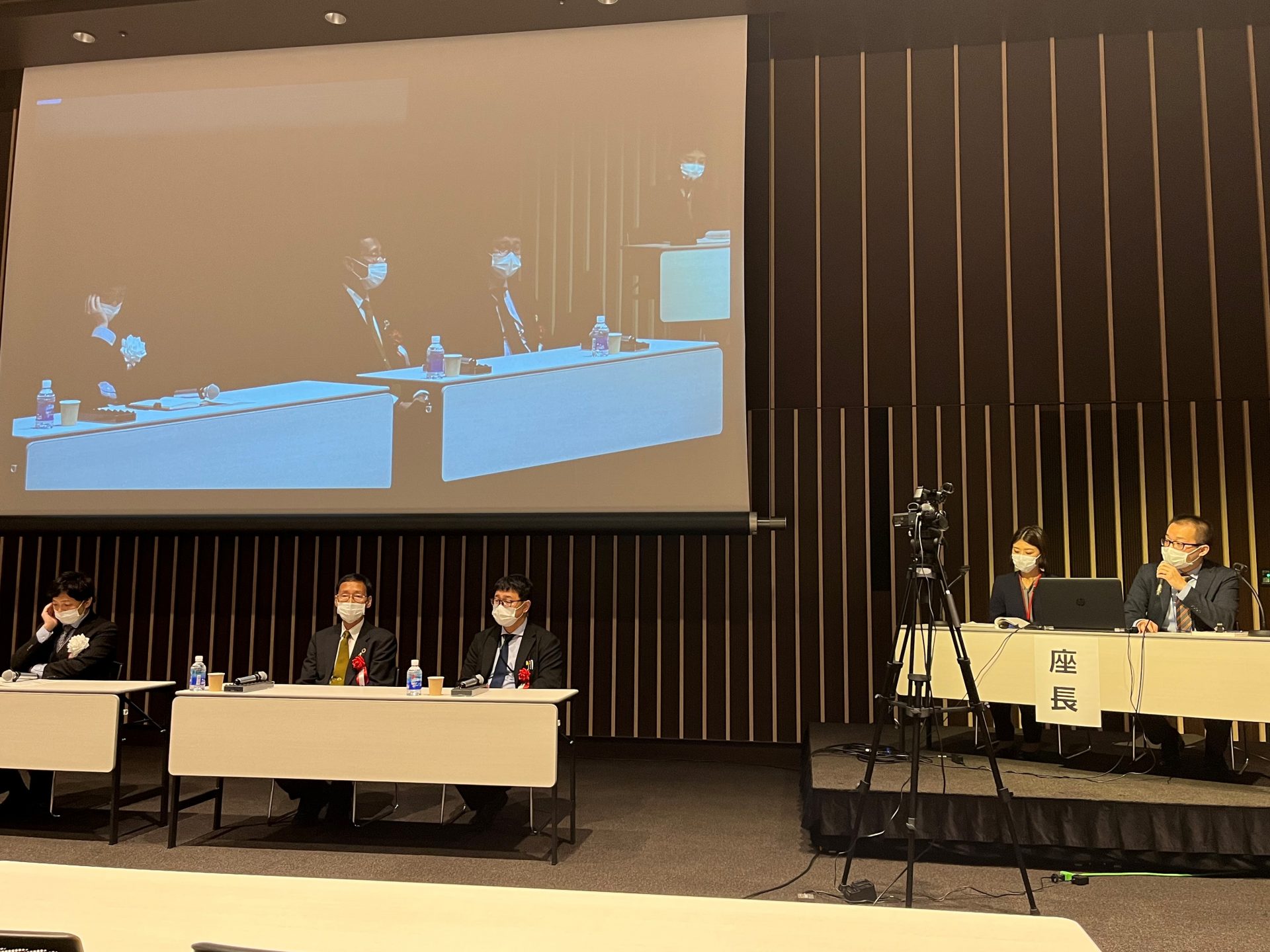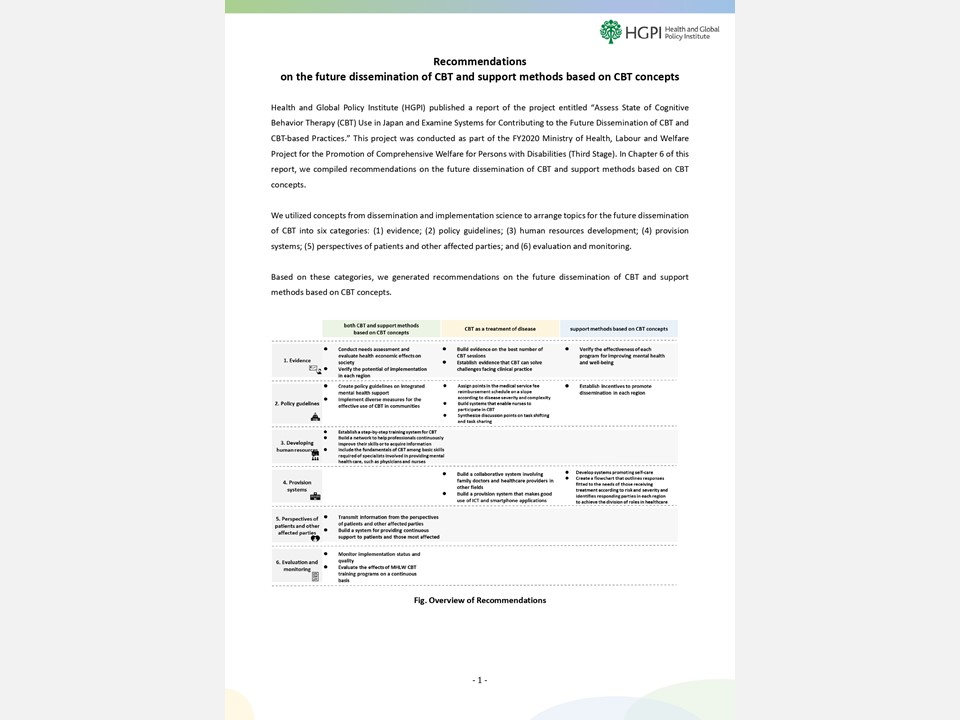[Event Report] The 119th HGPI Seminar “Utilizing Cognitive Behavioral Therapy Techniques to Enhance Support for Family Members, Long-Term Care Providers, and Other Supporters of People Living with Dementia” (September 19, 2023)
date : 11/2/2023
Tags: Dementia, HGPI Seminar
![[Event Report] The 119th HGPI Seminar “Utilizing Cognitive Behavioral Therapy Techniques to Enhance Support for Family Members, Long-Term Care Providers, and Other Supporters of People Living with Dementia” (September 19, 2023)](https://hgpi.org/en/wp-content/uploads/sites/2/hs119-top_JPNENG-1.jpg)
For the 119th HGPI Seminar, we hosted Project Assistant Professor Miyuki Tajima from the Keio University School of Medicine Department of Psychiatry and Neuroscience for a talk on how to best support family members, long-term care providers, and other parties who support people living with dementia using concepts from cognitive behavioral therapy (CBT). To share the perspectives of those who provide support for people living with dementia, this seminar also featured a lecture from special guest Mr. Morio Suzuki, who recently retired from his position of Representative Director of Alzheimer’s Association Japan (AAJ) in June 2023.
Key points of the lecture
- Family caregivers face various burdens and cognitive behavioral therapy (CBT) is effective for providing them with psychological care.
- When using applied behavior analysis (ABA) to care for people with dementia, instead of only focusing on behavior, behavior is viewed in a linked manner that includes antecedent (or trigger), behavior, and consequence (or response). Caregivers respond to behaviors by altering the antecedents or consequences.
- Techniques being used to reduce caregiver stress among family caregivers include behavioral activation, cognitive restructuring, and mindfulness.
- CBT is being implemented into packaged programs that are beginning to be introduced in various settings such as during visiting care or at Integrated Community Support Centers.
The need for CBT for family caregivers for people with dementia
Japan is experiencing an annual increase in the number of people with dementia who are 65 years of age and over. Their number is projected to increase to 7 million people in 2025, which will correspond to 1 in 5 people in that age group. As more people develop dementia, estimates show that the total societal cost of dementia in Japan will increase to approximately 15 trillion yen in 2025 and to 24 trillion yen in 2060. Rather than healthcare costs, this will mostly be due to increased demand for long-term care. Furthermore, the cost of informal care provided by family members and other people close to those with dementia will be comparable in scale to the cost of formal long-term care. Regarding the relationships among those who require long-term care and caregivers, over half of all long-term care is being provided by spouses, children, or other cohabitant family members of those who require long-term care. By gender, 65% of caregiving cohabitant family members are women. By age, over 70% of caregivers are 60 years of age or older. In other words, most long-term care is currently being provided by female elderly family members. Over half of informal caregivers starting with the family members of people with dementia have expressed strong feelings of anxiety and stress.
CBT and programs targeting family caregivers for people with dementia
Psychological interventions that are provided to family caregivers of people with dementia include psychoeducation, counseling, mindfulness, and combined interventions, but CBT has been the main approach to providing such care in recent years. A body of evidence has been accumulated for CBT, and it is characterized by its potential to be included in packaged programs to a certain extent. As such programs are comparatively easy to use even for people who are not specialists in the area of psychology, they are being utilized in a variety of interventions. In addition to face-to-face programs targeting individuals or groups, methods used to provide these programs also include telephone and online consultations as well as e-learning.
CBT was originally developed as a psychotherapy program for depression, but in recent years, it is also being used to treat other mental and physical disorders. CBT is also being used in some stress management programs for healthy people and these include programs for family caregivers. The CBT approach is based on the assumption that feelings and behaviors are impacted by how we think about or perceive things (our cognition). When used as a form of psychotherapy, CBT aims to correct cognition and alter behavior to improve mood.
The most famous program that uses CBT for family caregivers of people living with dementia is a coping strategy program called the STrAtegies for RelaTives (START) program that was developed at the University of London. In a large-scale randomized controlled trial of in-home family caregivers of people with dementia that aimed to gauge the effectiveness of this program, it was reported that in addition to improving depression, anxiety, and QOL among family caregivers, it was also an effective intervention in terms of health economics.
The START program has three main components. The first component is providing family caregivers with correct information and knowledge. This component includes educating them about dementia, helping them understand caregiver stress, and introducing them to social resources they can utilize. The second component is building understanding toward the behaviors of people with dementia from the perspective of applied behavior analysis (ABA) and examining methods of communicating with people with dementia together with family carers. The third is utilizing various CBT techniques to reduce caregiver stress. This lecture will focus on the latter two components, namely, ABA and addressing caregiver stress for family caregivers.
Caregiver stress from the perspective of applied behavior analysis: The chain of antecedent, behavior, and consequence
Many family caregivers face similar challenges regarding the behaviors of people with dementia, such as repeating themselves many times or saying things like, “Someone stole my wallet.” ABA does not only focus on the behaviors of people with dementia; rather, it also attempts to understand those behaviors as a chain that includes the antecedent (or trigger), behavior, and consequence (or response). To grasp the behavior in terms of the feelings or thoughts of the person with dementia, thorough interviews are conducted with family carers to examine various underlying factors for those behaviors such as the symptoms of dementia, the effects of functional decline, or the original personality of the person in question. As a general rule, this is done without renouncing the words and actions of the person with dementia, and there are times improvements are made by altering how caregivers interact with them, such as by making eye contact or speaking in a manner that helps the person with dementia feel at ease.
Reducing caregiver stress among family caregivers
Due to the physical, economic, social, or psychological burdens of providing long-term care, family caregivers face various forms of stress. In Japan, family caregivers still have few opportunities to share their feelings and thoughts or to have someone listen to them. Stress management techniques for such situations that are used frequently in CBT include behavioral activation, cognitive restructuring, and mindfulness. Behavioral activation is an approach in which family caregivers find healthy behaviors that they can act out alone or together with people with dementia and consciously incorporate those behaviors into their daily lives. This is effective at helping family caregivers reduce stress. In cognitive restructuring, caregivers recognize the thoughts that come to mind when they feel stress, broaden their perspectives, and reexamine the thoughts that make them feel distressed from various angles. Mindfulness is a technique that people can use to escape states of depression or anxiety caused by distracting thoughts like memories of past experiences or preconceptions to help them build awareness toward what they are experiencing in the moment and accept their current circumstances as they are.
Introducing CBT in various settings
A variety of programs based on the START program from the University of London have been introduced in Japan. For example, there is a packaged CBT program being provided by visiting nurses. After training, the nurses provide family caregivers with a stress reduction program while the person with dementia receives normal care. There is also a group CBT program that is provided at Integrated Community Support Centers in which family caregivers share their caregiving experiences with other family caregivers while learning CBT techniques as a group. CBT programs are also being offered online. As these examples show, it is now possible for programs for family caregivers utilizing CBT methods like these to be introduced in various settings.
[Event Overview]
- Speaker: Miyuki Tajima (Project Assistant Professor, Department of Psychiatry and Neuroscience, Keio University School of Medicine)
Special guest: Morio Suzuki (Former Representative Director, AAJ)
- Date & Time: Tuesday, September 19, 2023; from 18:30 to 19:45 JST
- Format: Online (Zoom webinar)
- Language: Japanese
- Participation fee: Free
- Capacity: 500
■ Speaker Profile:
Miyuki Tajima (Project Assistant Professor, Department of Psychiatry and Neuroscience, Keio University School of Medicine)
Professor Miyuki Tajima earned a Doctor of Philosophy in Health Sciences degree from the Department of Mental Health at the University of Tokyo Graduate School of Medicine. She assumed her current position after serving in roles including Research Fellow, National Institute of Mental Health, National Center of Neurology and Psychiatry (NCNP); and Director, Clinical Technology Development Office, National Center for Cognitive Behavior Therapy and Research, NCNP. Professor Tajima’s research examines methods of applying cognitive behavioral therapy-based approaches to provide various forms of support, including return-to-work support for people on sick leave due to depression, community suicide prevention, support for people living in areas affected by the Great East Japan Earthquake, and support for family caregivers of people living with dementia.
Top Research & Recommendations Posts
- [Policy Recommendations] The Path to a Sustainable Healthcare System: Three Key Objectives for Public Deliberation (January 22, 2026)
- [Research Report] The 2025 Public Opinion Survey on Healthcare in Japan (March 17, 2025)
- [Research Report] Perceptions, Knowledge, Actions and Perspectives of Healthcare Organizations in Japan in Relation to Climate Change and Health: A Cross-Sectional Study (November 13, 2025)
- [Policy Recommendations] Reshaping Japan’s Immunization Policy for Life Course Coverage and Vaccine Equity: Challenges and Prospects for an Era of Prevention and Health Promotion (April 25, 2025)
- [Research Report] The 2023 Public Opinion Survey on Satisfaction in Healthcare in Japan and Healthcare Applications of Generative AI (January 11, 2024)
- [Research Report] AMR Policy Update #4: Cancer Care and AMR (Part 1)
- [Public Comment Submission] “Assessment Report on Climate Change Impacts in Japan (Draft Overview)” (December 24, 2025)
- [Policy Recommendations] Developing a National Health and Climate Strategy for Japan (June 26, 2024)
- [Research Report] The Public Opinion Survey on Child-Rearing in Modern Japan (Final Report) (March 4, 2022)
- [Research Report] Survey of Japanese Physicians Regarding Climate Change and Health (December 3, 2023)
Featured Posts
-
2026-01-09
[Registration Open] (Hybrid Format) Dementia Project FY2025 Initiative Concluding Symposium “The Future of Dementia Policy Surrounding Families and Others Who Care for People with Dementia” (March 9, 2026)
![[Registration Open] (Hybrid Format) Dementia Project FY2025 Initiative Concluding Symposium “The Future of Dementia Policy Surrounding Families and Others Who Care for People with Dementia” (March 9, 2026)](https://hgpi.org/en/wp-content/uploads/sites/2/dementia-20260309-top.png)
-
2026-02-05
[Registration Open] (Webinar) The 141st HGPI Seminar “Current Status and Future Prospects of Korea’s Obesity Policy: Voices of People with Lived Experience in Policy Promotion” (March 3, 2026)
![[Registration Open] (Webinar) The 141st HGPI Seminar “Current Status and Future Prospects of Korea’s Obesity Policy: Voices of People with Lived Experience in Policy Promotion” (March 3, 2026)](https://hgpi.org/en/wp-content/uploads/sites/2/hs141-top-1.png)
-
2026-02-06
[Research Report] AMR Policy Update #5: Cancer Care and AMR (Part 2)
![[Research Report] AMR Policy Update #5: Cancer Care and AMR (Part 2)](https://hgpi.org/en/wp-content/uploads/sites/2/HGPI_20260204_AMR-Policy-Update-5.png)








